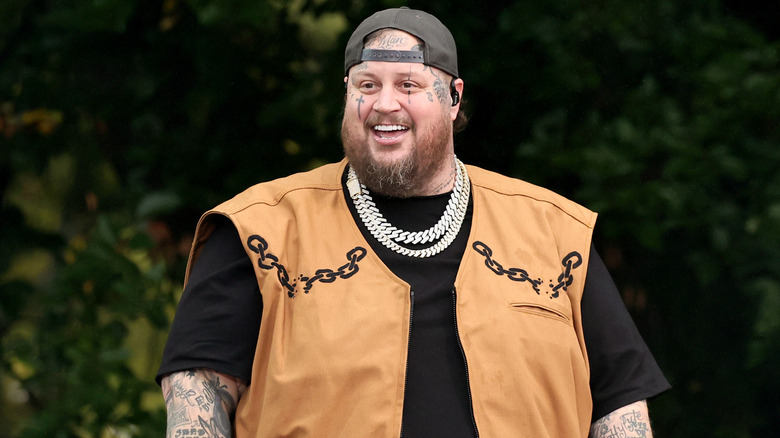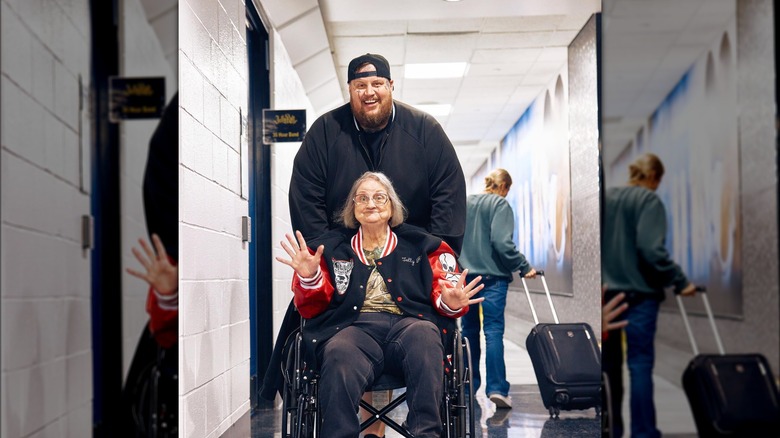Tragic Details About Jelly Roll's Childhood
The following article includes mentions of drug addiction and mental health issues.
Jelly Roll has become the tattooed face of outlaw country music, transitioning from many years in the hip-hop industry, then rock 'n' roll, to his newer, sultry Western ballads about crime and addiction that grace our ears today. The "Save Me" hitmaker has always been open about how his past struggles inspire his current music, but the plights of Jelly Roll's childhood are worse than anyone can imagine for a kid.
Jelly Roll has reached the top of the charts for his musical prowess, but he started out in blue-collared, crime-stricken Tennessee, where he fought against addiction, a fractured family, and time in prison. Born as Jason Bradley DeFord on December 4, 1984, the singer grew up in the small town of Antioch, a short 12 miles outside of Nashville. He was surrounded by music, getting his love for tunes from his mother, Donna. "She would come downstairs and throw a record on, and she'd light a cigarette at the table, and dude, I would watch the house change," Jelly Roll revealed on "The Joe Rogan Experience." Through music, the singer could escape from his hardship, ultimately molding his passion into a full-time career. Read below to learn more about Jelly Roll's grueling journey to stardom.
Jelly Roll grew up in poverty
The youngest of four, Jelly Roll grew up in what he describes as a rural neighborhood. "I don't think I knew anybody with a real job," he told GQ of his community. "I didn't even know a barber." His father, Horace "Buddy" DeFord, was a meat salesman who moonlighted as a bookie. The artist admitted that he would occasionally help his father, earning a weekly allowance to score betting slips from yesterday's game. "ESPN didn't run what happened between Alcorn State and Northwestern," he told the outlet. He said was the only guy around town that could give you a play-by-play.
When he was young and started making music, Jelly Roll would sell drugs, handing out his mixtape as a bonus for buying from him. "I'm just like, 'Yo, here's a sack of weed. Here's a gram of coke. Here's a mixtape,'" he told CBS News. "It was like my business card." The country singer felt that even his drug-dealing days were a pipeline to becoming a famous musician.
His parents' divorce led Jelly Roll to crime and addiction
By the time he was 13, Jelly Roll's parents could no longer make their marriage work and ultimately divorced in 1997. According to the singer, it was the ending of his father's fifth or sixth marriage. When his dad left, Jelly Roll felt the responsibility of being the man of the house, which involved financial implications. In an interview with Billboard, he said that the only way to support his mother feasibly was through crime. "I told my dad before he died [in 2019], 'I wonder, if I'd have moved in with you when you divorced, if I'd have went to Vanderbilt [University] or something.'" he said.
Instead, Jelly Roll turned to dealing. It wasn't a hard transition for the young rapper, as illegal activity had always been present in his life up to that point. It seemed like all the people around him struggled with addiction, including his mother. His dad organized illegal betting on the side. "There were drug dealers and drug users," he told Billboard. "I wanted to be the guy getting money, not the guy losing it." But eventually, Jelly Roll became the latter. The singer struggled with a cocaine addiction, which he told People magazine about, admitting that he thought everyone drank alcohol so they didn't have to use drugs while sober. "I had to learn that you could drink alcohol without doing cocaine," he said. "It took me a long time to learn that."
Jelly Roll took care of his mentally ill mother at 13
Jelly Roll has been refreshingly honest about his unfortunate upbringing, but has always noted the love he received from his parents. While his father ran a wholesale meat business, Jelly Roll's mother, Donna, was home struggling with extreme anxiety and depression. Her mental health problems led to her addiction to drugs, according to the "Need a Favor" hitmaker. "I can count the number of times on one hand, as a child, I [saw] my mother dressed and outside of the house," he told the "Bussin' With The Boys" podcast, adding that it was even rare to see her out of her bedroom.
However, he credits his mom for his new life as a professional musician, as she was the one who introduced him to music. Jelly Roll told "The Today Show" that the only time she would leave her bedroom would be to put a record on. "I always used the expression: I would watch my house go from kind of dreary to a nightclub, as soon as you could snap your fingers," he said. It was through these moments that the singer discovered the healing properties of music. While he's found his own relief from hard times through resonating melodies, he still sees it as a way to stay close to his mother. "To this day, I still think I'm writing songs to help her heal," he said.
He was arrested in his early teens
It wasn't long into his teen years when Jelly Roll was arrested for the first time. According to the singer, he spent ages 13 to 25 in and out of jail. Speaking on the "Flagrant" podcast, he said his first stint behind bars was for possessing marijuana. It was the first of 40 times that Jelly Roll would step foot in a jail cell. The artist was then incarcerated for an armed robbery case at 14, after he attempted to mug his drug dealer at the time. According to Jelly Roll, he spent 16 to 18 months in prison for the armed robbery case and was quickly sent back to jail after his release for another armed robbery at 15.
It wasn't until he was in his 20s that he vowed to change the trajectory of his life. In 2008, when he was 23 and imprisoned on a drug-related charge, the entertainer learned of the birth of his daughter, Bailee Ann. It was in that moment that Jelly Roll knew he had to turn his life around. Now, as a proud and present father in his teen daughter's life, Jelly Roll looks back on his life of crime in disdain. He even admitted on "Flagrant" that he thought about reaching out to one of the first victims of his robberies.
Jelly Roll was tried as an adult at 16
While his life in prison started early, Jelly Roll's most serious crime didn't occur until he was 16 years old. At the time, the singer was arrested for aggravated robbery after attempting to steal weed while armed with a gun. He was tried as an adult. The "Son of a Sinner" singer ultimately served over a year in prison, plus seven years of probation, but remembers the terror the justice system instilled in him when they were considering a 20-year sentence. "They were talking about giving me more time than I'd been alive," he told Billboard. "I was charged as an adult years before I could buy a beer, lease an apartment, get a pack of cigarettes." He felt that the system shaped him for a life behind bars.
Now, Jelly Roll is stepping up for the youth who are in the dark place he was once. In 2024, the Grammy nominee gifted the Davidson County Juvenile Justice Center — where he was once incarcerated – a brand new music studio. "These kids need chances," Jelly Roll said on "The Bobby Bones Show" podcast. "They need to see outside their environment." His musical philanthropy is a pledge to help incarcerated kids find an outlet, and maybe one day become country music stars like their mentor.
If you or anyone you know needs help with addiction or mental health issues, contact the relevant resources below:
- The Substance Abuse and Mental Health Services Administration website or contact SAMHSA's National Helpline at 1-800-662-HELP (4357).
- The Crisis Text Line by texting HOME to 741741, call the National Alliance on Mental Illness helpline at 1-800-950-NAMI (6264), or visit the National Institute of Mental Health website.





